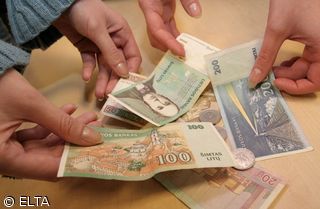The Georgian government and the International Monetary Fund remain at odds over ways to close the Caucasus country’s widening budget deficit, and over other measures to improve economic policy
Published:
20 July 2003 y., Sunday
The IMF has given Georgian officials until mid August to implement reforms in several specified areas. At stake for Tbilisi is not only direct IMF assistance, but also the Georgian government’s ability to reschedule its Paris Club debt.
An IMF delegation wrapped up a fact-finding mission to Georgia on July 7. At the conclusion of the visit, IMF representatives issued a memorandum stating that its ability to complete a final review of a nearly three-year-old Poverty Reduction and Growth Facility (PRGF) was dependent on the Georgian government’s willingness to carry out targeted reforms. The IMF set August 15 as the deadline for Tbilisi for reforms, including: trimming roughly 100 million lari (about $47 million) from the state budget; improving tax collection while simplifying the tax code; raising energy tariffs; and settling arrears to the state pension system.
If Georgia is unable to implement the changes, the IMF is likely to withhold the final tranche of a $31 million loan under the PRGF. Of far greater importance for Georgia, the IMF has threatened to withdraw its support for Tbilisi’s efforts to get its Paris Club debt rescheduled. Talks between Georgia and the Paris Club of creditor nations are scheduled to occur in September. If Tbilisi is unable to reschedule the debt, it faces a potentially budget-busting $50 million payment by the end of 2003.
"We’ve been trying to complete this [PRGF] review since November," IMF Resident Representative to Georgia Jonathan Dunn told EurasiaNet. However, Dunn stressed that the IMF "has left the door cracked open" for Georgia to make the demanded policy changes.
The IMF stance creates a quandary for Georgia’s government, as parliamentary elections loom in November. [For background see the Eurasia Insight archives]. Implementation of the IMF-mandated reforms could stir popular dissatisfaction, possibly costing President Eduard Shevardnadze supporters at the polls in November. Conversely, inaction by the government, especially concerning the Paris Club debt rescheduling, could create an even bigger public backlash. Either way, Georgia seems to be facing its last opportunity to implement reforms and avoid severe fiscal strain, possibly even default.
Šaltinis:
eurasianet.org
Copying, publishing, announcing any information from the News.lt portal without written permission of News.lt editorial office is prohibited.
The most popular articles
 According to the data presented by the Ministry of Finance, in end-January central government debt made up LTL26, 310.8 million or 28% of projected GDP for 2010 (LTL 93, 819 million).
more »
According to the data presented by the Ministry of Finance, in end-January central government debt made up LTL26, 310.8 million or 28% of projected GDP for 2010 (LTL 93, 819 million).
more »
 As far as countries affected by the economic crisis, China fared extremely well.
more »
As far as countries affected by the economic crisis, China fared extremely well.
more »
 The European Commission has authorised today a Slovak scheme with a budget of approximately €3.32 million which aims at supporting farmers in Slovakia who encounter difficulties as a result of the current economic crisis.
more »
The European Commission has authorised today a Slovak scheme with a budget of approximately €3.32 million which aims at supporting farmers in Slovakia who encounter difficulties as a result of the current economic crisis.
more »
 Commission sets out a 10-year strategy for reviving the European economy, casting a vision of ‘smart, sustainable, inclusive' growth rooted in greater coordination of national and European policy.
more »
Commission sets out a 10-year strategy for reviving the European economy, casting a vision of ‘smart, sustainable, inclusive' growth rooted in greater coordination of national and European policy.
more »
 The European Commission has launched today the Europe 2020 Strategy to go out of the crisis and prepare EU economy for the next decade. The Commission identifies three key drivers for growth, to be implemented through concrete actions at EU and national levels.
more »
The European Commission has launched today the Europe 2020 Strategy to go out of the crisis and prepare EU economy for the next decade. The Commission identifies three key drivers for growth, to be implemented through concrete actions at EU and national levels.
more »
 Launching of the “SCHOOLS’ initiative for innovation and changes” Grant scheme.
more »
Launching of the “SCHOOLS’ initiative for innovation and changes” Grant scheme.
more »
 EU Member States must not only deliver on their international aid pledges, but also bring in a financial transactions tax and a temporary debt moratorium, to help developing countries to cope with the effects of the global financial and economic crisis, said the Development Committee on Monday.
more »
EU Member States must not only deliver on their international aid pledges, but also bring in a financial transactions tax and a temporary debt moratorium, to help developing countries to cope with the effects of the global financial and economic crisis, said the Development Committee on Monday.
more »
 The EBRD is increasing its commitments to promote sustainable energy projects in Slovakia with a new €90 million funding under the existing Slovakia Sustainable Energy Finance Facility (SLOVSEFF) to ensure continuous implementation of energy efficiency and small renewable energy projects.
more »
The EBRD is increasing its commitments to promote sustainable energy projects in Slovakia with a new €90 million funding under the existing Slovakia Sustainable Energy Finance Facility (SLOVSEFF) to ensure continuous implementation of energy efficiency and small renewable energy projects.
more »
 According to the unaudited data, in 2009 AB Bank SNORAS earned LTL 8.7 million profit. The bank’s assets grew by 11 per cent up to LTL 6.342 billion during 2009 and were by LTL 647.8 million larger than at the beginning of 2009.
more »
According to the unaudited data, in 2009 AB Bank SNORAS earned LTL 8.7 million profit. The bank’s assets grew by 11 per cent up to LTL 6.342 billion during 2009 and were by LTL 647.8 million larger than at the beginning of 2009.
more »
 Aviation security measures that go beyond common EU requirements should be paid for by Member States, not by passengers, said Transport Committee MEPs in a vote on Monday that could put Parliament on a collision course with the Council of Ministers.
more »
Aviation security measures that go beyond common EU requirements should be paid for by Member States, not by passengers, said Transport Committee MEPs in a vote on Monday that could put Parliament on a collision course with the Council of Ministers.
more »